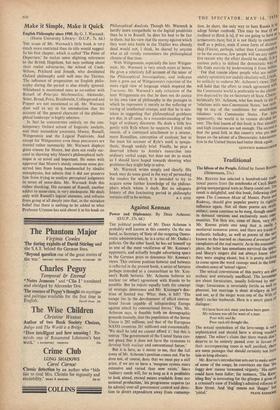Against Kennan
Power and Diplomacy. By Dean Acheson. us. 6d.) THE political position of Mr. Dean Acheson is probably well known in this country. On the one hand, as Secretary of State of the outgoing Demo- cratic administration, he is a critic of Mr. Dulles's policies. On the other hand, he has set himself up as one of the most vociferous of Mr. Kennan's opponents, and actually bought advertising space in the German press to denounce Mr. Kennan's views. This curious position betwixt and between is reflected in the present book, a series of lectures perhaps intended as a counterblast to Mr. Ken- nan's Reith lectures. Mr. Acheson believes no nuclear (or other) agreement with Russia to be possible. But he rejects equally both the concept of strategic deterrence and ;Mr. Kissinger's doc- trine of limited war. What, then, is left? 'The escape lies in the development of allied conven- tional forces capable of safeguarding Europe against attack by conventional forces.' This, Mr. Acheson says, is feasible both on demographic grounds (namely, that the population of the Soviet Union is 202 millions, and that of the European NATO countries 261 millions) and economically. 'We shall be told we cannot afford it'; but this is untrue. 'The government of the United States can- not plead, that it does not have the resources to develop both nuclear and conventional forces.'
But it is here, as it seems to me, that the full irony of Mr. Acheson's position comes out. For he does not, of course, deny that we must pay a stiff price, if we are to have a 'weapons system more extensive and varied than now exists.' Since `military needs will, for as long as it is profitable to look ahead, exceed means available from our national production,' his programme requires (as he admits) over-all government control and direc- tion to divert expenditure away from consump- tion. In short, the only way to beat Russia is 10 adopt Soviet methods. This may be true (1 a': inclined to think it is), if we are going to have a: armaments race; but it is not likely to comatea" itself as a policy, since if some form of dictator- ship (Fascist, perhaps, rather than Communist) Is to be the outcome, few people will see any opa,ra. tive reason why the effort should be made. It 'sat curious policy to defend the democratic waY life from outside by undermining it from with,'"; For that reason alone people who are neitue,; unduly optimistic nor unduly idealistic will, I thin", be unlikely to endorse Mr. Acheson's views. 111 will hold that the effort to reach agreement the Communist world is preferable to the &tern!' tive depicted by the ex-Secretary of State. Charal teristically Mr. Acheson, who has much to saY 'relations with non-Communist States,' has 110,t",, ing to say of the conditions for establish!" relations with Communist States. For 1)1,111; apparently, the world is to remain divided ever. The first lesson of this book is that sincerll? and high intentions are not enough. The second that the good folk in this country who pin their hopes on the advent of a Democratic Administre- tion in the United States had better think again- GEOFFREY BARRACLOOti


































 Previous page
Previous page